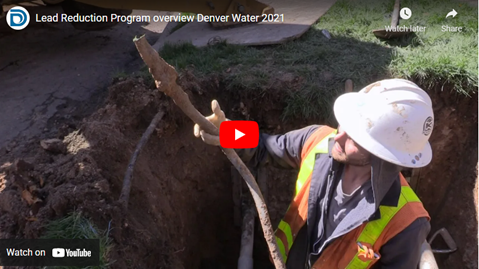Roya Alkafaji, Manager, Healthy Communities and Lindsay McCormick, Senior Manager, Safer Chemicals
Denver Water has one of the most successful lead service line (LSL) replacement programs in the country. Since it began the program in 2020, the utility has replaced nearly 14,000 LSLs—prioritizing lines to buildings serving vulnerable populations, such as child-care facilities. Denver Water has also distributed over 102,000 filters to local residents. EPA should continue to support their innovative approach.
In 2019, we blogged about a novel program that Denver Water designed to address the estimated 64,000 to 84,000 LSLs in its system. These lead pipes connect buildings to water mains under the street. At the time, the water utility proposed to fully replace all LSLs in their entirety within 15 years under its Lead Reduction Program.
The utility decided to fund the work through water rates and bonds, hydropower production, and other sources. In addition, they proposed to provide filters to residents until six months after replacement of the LSL.
Critically, the program includes a comprehensive effort to engage local partners to reach all members of the community. For example, Denver Water partnered with CREA Results, a local community-based organization that is helping to engage and educate Spanish-speaking and immigrant communities on the risks of lead in drinking water and to ensure that residents understand the steps involved with LSL replacement in their neighborhoods. Denver Water’s program has emerged as a national model and its success is recognized by the Lead Service Line Replacement Collaborative and EPA (including its recent service line inventory guidance).
When the program was initially proposed in 2019, EPA Region 8 approved it for a three-year period to allow Denver Water time to demonstrate that its approach to LSL replacement would be successful. EPA permission was required because the utility sought to vary from the requirements of the Lead and Copper Rule (LCR) by fully replacing LSLs over 15 years instead of using orthophosphates to control corrosion and reduce leaching of lead from the pipes into the water. Wastewater utilities in the region were concerned that using orthophosphate would aggravate persistent algae blooms in the South Platte River, south of Denver.
Instead, Denver Water’s program uses a multipronged strategy of maintaining a public online service line inventory, proactively replacing LSLs, and increasing pH corrosion control treatment, as well as providing filters to residents.
Now, Denver Water has asked EPA for permission to extend its replacement program for the full 15 years. The Denver Water team has exceeded its 7% replacement rate goal each year, ensured that public health is protected through the filter program, and centered environmental justice by prioritizing underserved communities.
How You Can Help
EPA gave preliminary approval on September 1, 2022 on the grounds that the program provides “at least as efficient lead reductions as compared to compliance with the [LCR revision] provisions regarding optimal corrosion control treatment.” Before the new proposed variance is finalized, EPA is seeking input from the public on this decision.
EDF fully supports the continuation of Denver Water’s Lead Reduction Program. If you’d like to lend your support, EPA Region 8 is holding a public comment period where you can submit written comments. If you’re local to Denver, consider attending one of two virtual public meetings on October 5 and October 6, 2022. The public comment period ends on October 7, 2022.
